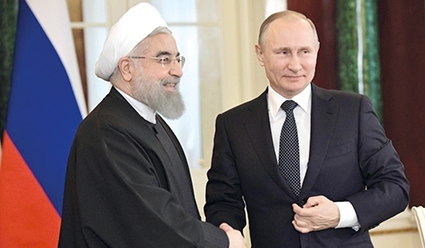Russian Dilemmas Over Syria
Analysis
Over the past several months, one of the major concerns in the Kremlin has been to understand to what extent Israel will continue to carry out preventive strikes on Syrian soil.
On February 10, an armed Iranian drone was shot down over Israeli airspace, prompting a swift and devastating Israeli response. Two months later, on April 9, Israeli jets struck again, bombing a T-4 and killing 14 personnel - including at least seven IRGC troops. Russian Foreign Minister Sergei Lavrov called this a "very dangerous development."
These incidents suggested that an Israeli-Syrian (by extension Iranian) military engagement could evolve into a serious situation that might spin out of Russian control. This is worrisome to the Russians, as they are keen to keep the balance in Syria.
Therefore, as tensions escalate between Iran and Israel and the risk of a major confrontation between the two in Syria increases, how Russia might respond is an important factor to evaluate.
For Russia, alienating Israel around the Syrian battlefield would be an unfortunate development. One of the major reasons for this is the geopolitical setting where, on a broader level, Russia tries to maintain a dominant position in Syria after gaining important victories. Despite successes, the Russians are worried about the Syrian battlefield becoming more crowded. With the US unlikely to withdraw its military forces, the Turkish operation in Afrin, in the north of the country, powerful Iranian proxy forces currently close to the Israeli border, and little success in at the recent peace conferences, Russia is least interested in having Israel being drawn in the conflict militarily.
This could explain why Russia conceded on some crucial points regarding the security of Israel. For instance, after the US and its allies shot a cruise missile against Syria on April 14, Moscow propounded ideas on supplying S-300 air-defense missiles to Damascus, which was suspended by the Russians in 2013 because of Israeli opposition.
After the western allies’ strikes, the Russian foreign minister Sergei Lavrov said the strikes had removed any moral obligation Russia had not to transfer the missiles. At the same time, Russia's prominent Kommersant daily quoted unnamed military sources as saying deliveries might begin imminently.
However, following the Israeli PM’s visit to Russia in early May for Victory Day festivities, another prominent Russia daily Izvestia cited a top Kremlin aide, Vladimir Kozhin, who said that Moscow was not in talks with the Syrian government about supplying advanced S-300 ground-to-air missiles. This means an apparent U-turn by the Russian government.
Yet another reason might be those occasional hints in the Russian media from defense and political sources that if Iran attacks Israel from Syria, either itself or through its proxy Hezbollah, Israel will not hold back and will respond forcefully, targeting Iranian soil.
This in fact shows the limits beyond which Russia-Israel cooperation might be strained. On a more global level, there is a hypothetical possibility that Russia could be a potential mediator in alleviating security grievances between Iran and Israel. This will be a fine diplomatic move by the Russians to show to the world that relative peace between the two arch-rivals would hinge upon Moscow. This thinking might indeed be truthful as indicated in numerous hints from the Russian media over the recent period. Moreover, since Vladimir Putin is essentially left out of potentially historic developments around the Korean Peninsula and Donald Trump’s diplomatic triumph, the Kremlin may be seeking to play as a power broker in the Middle East.
Despite some concessions made to Israeli interests in Syria, these do not show that the Iran-Russia partnership would not be further strengthened. In fact, there are many new sticking points for both countries. The US’ withdrawal from the famous Nuclear Agreement made Russia and European countries unite against the possible breakdown of the agreement. Joint opposition against the US pressure makes Moscow and Tehran more than just allies of convenience. It is this what makes Russia’s position trickier in the nascent Iran-Israel confrontation in Syria as, for the Russians, both countries are important in seeking to balance the unstable geopolitical situation around Syria. As geopolitical conditions in the Middle East are still railing from the Syrian conflict, it is for the moment extremely difficult to forecast a scenario even for a short period.
A couple of things are clear though. The Russians also understand that considering Israel’s security imperatives, intermittent Israeli intervention is taking place. They also know that it is likely that Israel will have to respond again, even if the Golan Heights are not directly threatened. The Iranians on the other hand, due to their geopolitical imperatives based on geography and military interests, are unlikely to make concessions in Syria. Suffice to say that these different perspectives are bound to clash from time to time.
It is this difficult balancing act that Russia wants to cleverly play between the two countries to try to position itself as a primary player in mitigating conflict possibilities between the two geopolitical enemies.
By Emil Avdaliani












